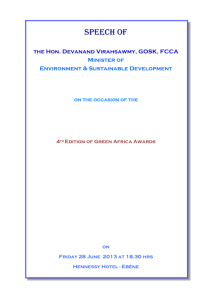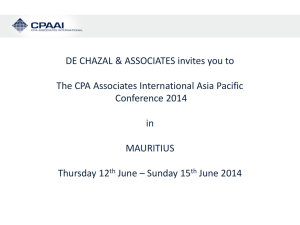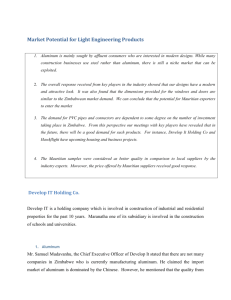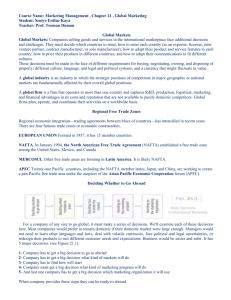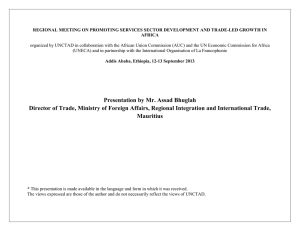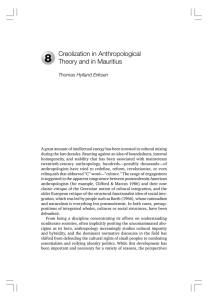GROWTH: How Mauritians can become exporters of services?
advertisement
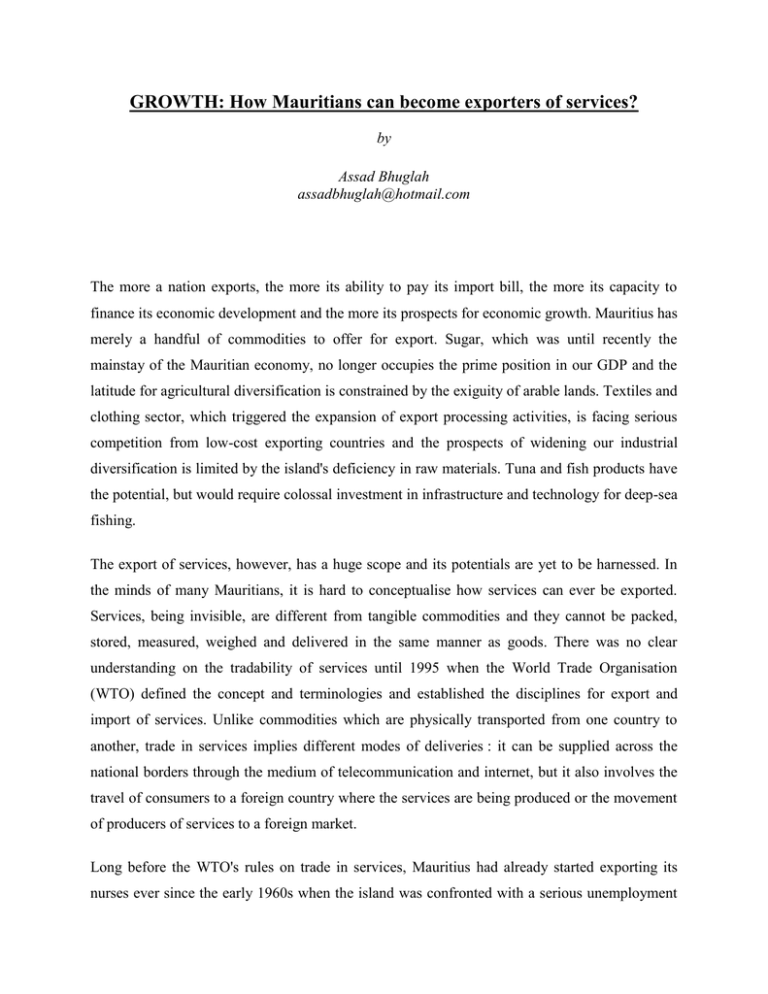
GROWTH: How Mauritians can become exporters of services? by Assad Bhuglah assadbhuglah@hotmail.com The more a nation exports, the more its ability to pay its import bill, the more its capacity to finance its economic development and the more its prospects for economic growth. Mauritius has merely a handful of commodities to offer for export. Sugar, which was until recently the mainstay of the Mauritian economy, no longer occupies the prime position in our GDP and the latitude for agricultural diversification is constrained by the exiguity of arable lands. Textiles and clothing sector, which triggered the expansion of export processing activities, is facing serious competition from low-cost exporting countries and the prospects of widening our industrial diversification is limited by the island's deficiency in raw materials. Tuna and fish products have the potential, but would require colossal investment in infrastructure and technology for deep-sea fishing. The export of services, however, has a huge scope and its potentials are yet to be harnessed. In the minds of many Mauritians, it is hard to conceptualise how services can ever be exported. Services, being invisible, are different from tangible commodities and they cannot be packed, stored, measured, weighed and delivered in the same manner as goods. There was no clear understanding on the tradability of services until 1995 when the World Trade Organisation (WTO) defined the concept and terminologies and established the disciplines for export and import of services. Unlike commodities which are physically transported from one country to another, trade in services implies different modes of deliveries : it can be supplied across the national borders through the medium of telecommunication and internet, but it also involves the travel of consumers to a foreign country where the services are being produced or the movement of producers of services to a foreign market. Long before the WTO's rules on trade in services, Mauritius had already started exporting its nurses ever since the early 1960s when the island was confronted with a serious unemployment problem, with practically no job prospects for its thousands of young people turning out of college. Many opted for nursing jobs offered in UK and other European countries. It was rather an outlet for emigration or a brain-drain process with no option of returning to the homeland. In the WTO's definition of trade in services, any worker or professional wishing to sell his or her services abroad must stay in a foreign country on a temporary basis and must obligatorily return back to his or her country of origin after accomplishing his or her assignment abroad. Evidently, this temporary movement of workers and professionals abroad has several advantages over the permanent migration : there is certainty of foreign remittances flowing to home country ; with the exposure, experience and skills obtained in a foreign land there is a process of brain-gain instead of brain-drain for the home country ; and the temporary presence of foreign nationals has lesser chance of arousing bitter anti-immigrant sentiments in the host countries. If Mauritius wants to secure a meaningful share on the international labour market, it must look beyond the export of skilled and semi-skilled workers. It must pave the way for Mauritian professionals and young graduates to secure temporary assignment abroad. Though much of this initiative falls within the domain of private business, it nonetheless requires government-to-government action when it comes to the question of visa relaxation, mutual recognition of qualifications and repatriation of foreign remittances. One of the areas where Mauritius has done well in terms of exporting its services is evidently the tourism sector. In the WTO's jargon, this type of export is generated through the movement of consumers (tourists) to Mauritius. Traditionally, Mauritius has capitalized on its natural endowments and has attracted the tourists to consume mainly its gift of Nature – sun, sea and beaches. Of late, Mauritius has started diversifying its tourism products by offering specialized health, wellness, education and conferencing services. In reality, it is the big firms that have the capacity to sell these services since the entry into this business requires huge investment in terms building of hotels, luxurious villas, clinics, colleges, infrastructure, access facilities, utilities and image-branding. However, all these economic activities produce trickling-down effects and the general public must be empowered to take advantage of the collateral benefits. This empowering initiative must not be limited only to small handicrafts, beach-hawkers, taxi-drivers and skippers but must also aim at providing more visibility to multitude of small restaurants, beauty therapists, individual dentists/doctors, tailors, fruit-sellers and vegetable-growers amongst others. The daunting challenge for Mauritius is how to step up its export of services through commercial presence of its firms abroad. When a local company establishes its business abroad through a branch, it opens the avenues for exporting not only its services-mark, but also its management know-how, its personnel and experts and its services technology. The Mauritian firms are very small compared to world standard and they are insignificant in front of multi-national companies which control almost the totality of the global business. In the field of construction services alone, Mauritian firms can hardly afford to position themselves on the international market despite the fact that the entire region of COMESA and SADC is bubbling with construction and infrastructure works. Mauritian firms must seriously think in terms of teaming up with strategic partners to overcome their shortcomings. For a geographically isolated island, the cross-border supply of services through the ICT mode is an indispensable element in the overall export strategy for services. It is not only important for big ventures like business outsourcing, call centres and back-office operations but also to homebased small business exercised by accountants, architects, graphic designers, translators, legal counselors, musicians, writers, proof-readers, journalists, distance-learning coachers, datacollectors, researchers amongst others. The 21st century is rapidly moving towards a Networked Society where the broadband will transform the way we live and how we access virtually every product and service. In this new digital economy, the Government's role is not only to provide information-based infrastructure but also to address a host of regulatory issues such as security of data, cyber crime, authentification of digital signature, legal status of digital contract, payment claims and dispute resolution. Trade in services is centered more around the quality, ingenuity and productiveness of human resources. It is essentially the exertion of human body and mind. Unlike trade in goods where the marketing is targeted around the merit, quality and features of the product, the promotion of trade in services is to a large extent aligned on the positive elements of the human resources. For a Mauritian to be able to position himself/herself on the global market, he/she must continuously and consistently strive towards excellence.



